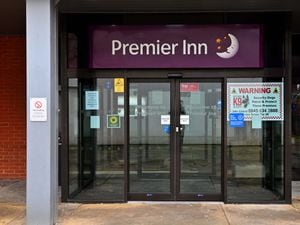New ways of office working as firms adapt
Freedom Day has come and gone – but for many office workers in the West Midlands nothing has changed.

Companies with office teams across the Black Country say they are still adapting to the withdrawal of coronavirus restrictions.
And for most that means they are taking a cautious approach, especially in the light of rising virus infections and the onset of the 'pingdemic' and thousands having to isolate.
There has been no rush to bring office teams back wholesale, with many choosing to introduce hybrid working systems which will see workers having a mix of some days working from home and others behind their desk at their workplace.
Wolverhampton healthcare cover business Paycare, which employs 34 staff, is to trial such a new system of working from September through to the new year.

Chief executive Kevin Rogers said: "We have been remote working since March 12 last year. We were up and running remotely within a couple of days. The guys have been absolutely brilliant and there was no drop off in service levels.
"When looking to return to work we ran a survey across the team and found all wanted an element of flexibility, and two to three days in the office and the others working from home.
"There is absolutely no reason why we can't facilitate that because we have been doing it for over 12 months and service levels to policy holders have if anything got better and there has been increased productivity."
The Dudley Building Society, which has its head office at The Waterfront, Brierley Hill, is continuing with home working for its headquarters team.
Marketing manager Amy Morgan said staff had been surveyed before deciding on the new policy.
"Home working has worked really well for us. Coronavirus has changed the approach for us to a more flexible way of working," she explained.
"The policy going forward for office-based staff will be to allow them to work from home where they wish. If they do wish to work in the office they can do so," she added.
But the Dudley-based foundry group Thomas Dudley said most of its staff were back in offices now.
People and development director Michele Bickerton said only a small number of people were now working from home, in areas like payroll and sales.
"As a rule everyone is working out of the office now, but we are maintaining previous policy on Covid including sanitising, screens and asking visitors to wear masks," she added.
Where people have individual issues or have to self isolate they are being supported to work from home.
Wolverhampton-based pubs and restaurants group Marston’s said its office-based workers should use the office for around 60 per cent of their working week so that a person who normally works five days a week should be in the office typically three days, with flexibility to work remotely on the other two days.
"Our approach allows employees to split their time between attending the workplace/office and working remotely. Remote work could be done from home, ‘on the go’ while out in the field or working from other suitable locations," explained a spokesperson.
Neil Anderson, director of external affairs for the Black Country Chamber of Commerce, which has its offices in Wolverhampton, said: 'Whilst the pandemic and lockdowns have given many businesses the opportunity to reflect and consider how they service their customers, in most cases this period has accelerated longer terms around agile working.
“In some instances, certain businesses have to have a central base of operations and are keenly looking forward to returning to pre-pandemic levels of staff working from these facilities.
"For others, flexible working options look like they're here to stay.
"From the chamber's perspective, our office has remained fully open throughout for export documentation which require paperwork to be stamped and ensure that local firms can get their goods and services to markets across the world.
“Prior to lockdown restrictions, as the region's leading business support organisation, our colleagues were supporting our members wherever and whenever they needed this support, and were very much operating a hybrid way of office and off site work to fulfil this and we will continue delivering support in this way.”
Research by independent financial comparison website NerdWallet found 45 per cent of UK businesses expect all staff to return to the office now lockdown restrictions have been lifted
A survey saw 34 per cent say that they were not satisfied with the way staff have been managed throughout the pandemic, with 33 per cent admitting that employees’ health and safety has not always been their number one priority.
Almost half have invested in new office equipment to improve health and safety and better facilitate social distancing, while 53 per cent have allowed greater flexibility in the hours that employees work.
Also 59 per cent of companies plan to conduct a review of how they handled the pandemic to see what lessons can be learnt.
With lockdown lifting there is also a need to redress the balance of working life.
According to PayPal’s Business of Change: Recovery and Rebuild report, 16 per cent of staff at small and medium-sized businesses have revealed they worked at least two extra hours per day on average over the year, compared to pre-pandemic, and almost one in 10 is working three or more additional hours per day.
A quarter of SME employees still working more hours now than before the pandemic
Ben Ramsden, head of SME at PayPal, shared: “Lockdowns have seen Britain’s small businesses fundamentally change the ways in which they work in order to survive. With restrictions easing more than they have for the last 15 months, we at PayPal along with our partners are rallying together more than ever before to launch digital commerce solutions to help small businesses survive and grow despite the challenging environment.”





